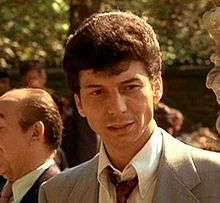Paulie Gatto (The Godfather)
| Paulie Gatto | |
|---|---|
 | |
| First appearance | The Godfather |
| Last appearance | The Godfather: The Game |
| Created by | Mario Puzo |
| Portrayed by |
John Martino Tony Alcantar |
| Information | |
| Gender | Male |
| Occupation | Mobster |
| Family | Corleone family |
| Religion | Roman Catholic |
Paul "Paulie" Gatto is a fictional character in Mario Puzo's novel, The Godfather (1969). He is portrayed by John Martino in the Godfather film trilogy directed by Francis Ford Coppola.[1]
Character biography
Gatto is a mobster who works for the Corleone family, and is a trusted soldier in the crew of Peter Clemenza.
In The Godfather, Don Vito Corleone orders Clemenza, via consigliere Tom Hagen, to handle the beating of two teenage boys who assaulted the daughter of undertaker Amerigo Bonasera, Mrs. Corleone's goddaughter. Clemenza assigns Gatto to the job, who then recruits two former professional boxers turned Corleone Family loan enforcers to assist. A deleted scene from the film depicts Gatto beating the two boys.
When Clemenza discovers that Gatto helped Virgil Sollozzo and the Tattaglia Family set up Don Corleone to be assassinated, the Don's son Sonny orders Clemenza to kill Gatto. According to the novel, Sonny initially suspects Clemenza of being a part of the conspiracy, but Clemenza is eventually cleared. Through Family contacts with the phone company, Sonny learns of numerous calls between Paulie and Sollozzo/Tattaglia contacts. Having trained Gatto himself, Clemenza considers his protegé's treachery a personal insult. Clemenza decides to use one of his top associates, Rocco Lampone, on the hit to give Lampone a chance to "make his bones".
In order to lull Gatto into a false sense of security, Clemenza and Lampone drive around in a car with him for at least two days looking for good sites where Corleone men can "go to the mattresses" (hide out) in the imminent mob war. While Clemenza steps out of the car to relieve himself, Lampone kills Gatto with three shots in the back of the head. Clemenza then utters (to Lampone) his most famous line in the film, "Leave the gun. Take the cannoli."[2][3]
References
- ↑ "Movies: The Godfather". The New York Times. 1972.
- ↑ Bona, Mary Jo (2010). By the Breath of Their Mouths: Narratives of Resistance in Italian America. State University of New York Press, Albany. p. 238.
- ↑ Van Ostrand, Maggie (February 8, 2009). "'Leave the Gun. Take the Cannoli,' and Other Godfather Stories". Film School Rejects.
External links
- Paulie Gatto at the Internet Movie Database
- "'Leave the gun. Take the cannoli' (2:15 min. segment beginning at Clemenza's home)". Youtube.